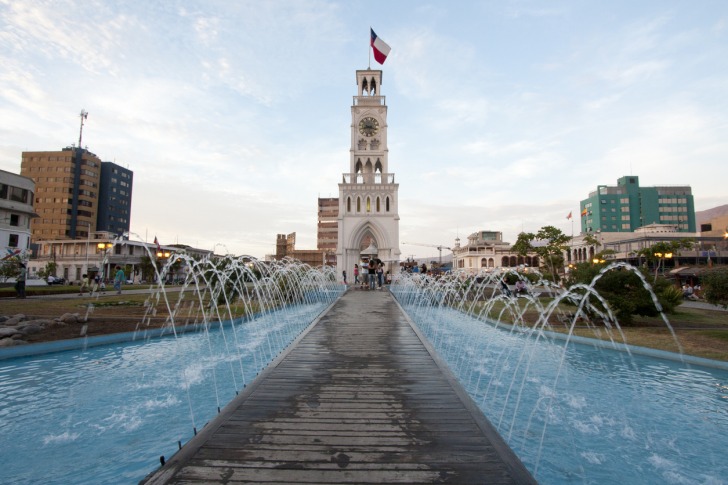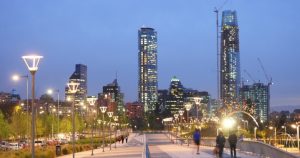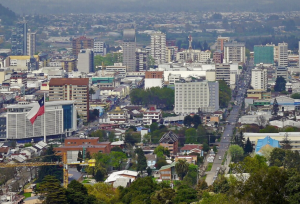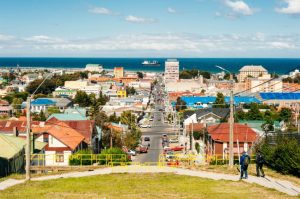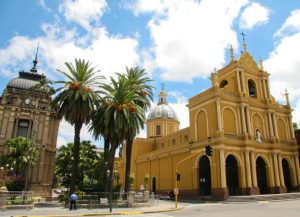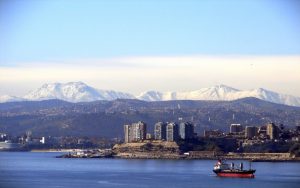 Chile : Safety by City
Chile : Safety by City
Chile - safety as a country
Iquique is a coastal city in Chile.
It’s located in the Tarapacá Region.
It’s the largest city in Northern Chile.
It’s one of only two free ports in the country.
The city grew up due to a thriving salt peter industry.
Today, Iquique is a popular tourist destination.
You’ll find beautiful beaches, adventure tourism, and even a seaside casino.
Before you pack your bags, however, you should know if Iquique is a safe location to travel to.
Warnings & Dangers in Iquique

OVERALL RISK: MEDIUM
Iquique is considered a relatively safe place to travel to, particularly by South American standards. Chile has a robust infrastructure in Iquique and other cities. The city has a thriving tourist industry and friendly locals. However, the rate of violent crime has gone up significantly in recent years. There are also concerns about civil unrest, drug and gun trafficking, and natural disasters. If you want to visit South America, Iquique, Chile is a great destination. However, you should take a few precautions to stay safe.

TRANSPORT & TAXIS RISK: MEDIUM
Roads in Chile vary greatly in quality, but roads in the city are typically well-maintained. However, you should be cautious when driving on secondary roads. They may be poorly lit and lack guard rails. Public transportation is relatively safe. However, pickpocketing and robberies are common. Criminals tend to target tourists, which are plentiful on public buses. When hiring a taxi, be sure to use only official taxis. Be sure the taxi has a meter, and agree on the fare beforehand. Some taxis will overcharge tourists. Check the amount on the credit card reader before using your card, and keep a close eye on anyone handling your card. Criminals will pose as taxi drivers, particularly near the airport exit. When at the airport, hire a taxi from the dedicated counter.

PICKPOCKETS RISK: MEDIUM
Pickpocketing is common in Iquique, Chile. It's particularly common in tourist areas, including viewpoints, hotel lobbies, and tourist attractions. You should also be vigilant in restaurants, including outdoor patios. Pickpocketers often work in teams. One person will distract you, while someone else steals your belongings.

NATURAL DISASTERS RISK: HIGH
The risk of natural disasters in Iquique is high. Tsunamis and earthquakes are major concerns. There is a high risk of earthquakes in the area. These earthquakes can also trigger tsunamis. In 2014, an 8.2 earthquake hit the area, causing extensive damage. Iquique is also prone to volcanic activity, forest fires, and torrential rains.

MUGGING RISK: MEDIUM
Crime, including muggings, has increased in recent years in Iquique. This is due to foreign gangs coming into the country. The cocaine and weapons trafficking trades are using the Iquique port. European gangs are also importing synthetic drugs through Iquique. Mugging of tourists isn't particularly common, but it does occur. Given the rise of violent crime, you should use caution when traveling in Iquique.

TERRORISM RISK: MEDIUM
Foreign terrorist attacks are very rare in Chile. However, domestic terrorism or civil unrest are a problem. In fact, the U.S. Department of State advises a high degree of caution when traveling in Chile due to crime rates and civil unrest.

SCAMS RISK: MEDIUM
Scams do occur in Iquique, but they aren't particularly common. Credit card fraud is an issue, so you should guard your cards carefully. Be cautious when using card readers. Phone scams are also an issue. This can be a problem for tourists. Never give your personal or financial information to anyone over the phone. You should also avoid discussing your location, and the location of family members.

WOMEN TRAVELERS RISK: MEDIUM
Women travelers are relatively safe in Iquique. You should be cautious, and avoid leaving any drinks unattended. There are incidents of women being drugged because things were slipped into their drinks. The risk of harassment on the street is low, and the locals are typically very friendly. There's also a reasonable police presence in Iquique.

TAP WATER RISK: LOW
The tap water in Chile is safe to drink. However, some areas may have "hard water". This affects the taste of the water, but not the safety. You should have no issues drinking the tap water. You can also safely use it for cooking or bathing. While tap water is safe, you should avoid drinking water from streams or lakes. This includes accidentally swallowing water if you are swimming. Chile's water supply is naturally high in arsenic. However, current sanitation and filtration keep the arsenic levels in drinking water within the allowed limits set by the WHO. While the tap water is safe, you should avoid drinking water from streams or lakes. This water may be contaminated with bacteria or pollutants. Microorganisms in the water can have a greater impact on you than the local population because your body isn't accustomed to them.
Safest Places to Visit in Iquique
Most of the city is safe, but some areas are well known for their safety and low crime rate.
You can enjoy Plaza Prat and Paseo Baquedano at any time, day or night.
These areas also have plenty of people at all times.
The seaside and beach areas are also safe, and popular tourist spots.
Cavancha is particularly known for being a safe area.
You can feel comfortable walking alone here at night.
The Cavancha peninsula has lots of bars and nice homes.
It’s also a safe area to explore.
Places to Avoid in Iquique
The main area you should avoid when traveling in Iquique is Población Jorge Inostroza.
It’s ok to drive through this area, with your doors locked.
However, you should avoid walking around the area, even in the daytime.
The Cerro Dragon neighborhood is not too bad during the day, but you should avoid this area at night.
You should also avoid the area north of the city center, or Mercado Centenario, at night.
Lastly, the Bolivian neighborhood can be dangerous.
Bolivians commonly carry large amounts of cash that they earn from working in other areas.
This makes them a prime target for criminals.
Safety Tips for Traveling to Iquique
- Travel With Others. There’s safety in numbers. It’s always best to travel with a group. When you are out and about, try to have at least one person with you. This is particularly important at night. If you must travel alone, stay in well-populated areas.
- Avoid Demonstrations. Civil unrest is a concern in Iquique. If you notice any type of demonstration, steer clear of it. You should also pay attention to any instructions or warnings issued by local authorities.
- Research Adventure Companies. Adventure tourism is very popular in Iquique. If you want to find your next thrill, you can certainly do that here. However, before you book a rock climbing expedition or go parasailing, be sure you do your research. It’s essential to make sure you hire a reputable company. Check out some reviews online, and don’t hesitate to ask the locals as well.
- Respect the Wildlife. Chile doesn’t have any venomous snakes and few dangerous animals. However, they do have two venomous spiders. The black widow is the most concerning, and bites can be fatal. These spiders can be found in the city, so keep an eye out for them.
- Get Up to Date on Vaccines. Chile doesn’t carry the risks that some South American countries do, so you won’t need to worry about Zika or Yellow Fever. However, there are some vaccines that are recommended before heading to Chile. Hepatitis A and Typhoid are the only vaccines that vaccinated U.S. adults will need before traveling to this country, assuming you are up to date on routine vaccines like Chicken Pox, Meningitis, and Pneumonia.
- Avoid Altitude Sickness. Depending on where you go in Iquique, it is possible to develop altitude sickness. You are unlikely to experience serious or life-threatening symptoms at this altitude. However, you may become dizzy, drowsy, have a racing pulse, and feel generally unwell. Take it easy when in Iquique, particularly if you ascend to higher elevations. You can also get a prescription for medicine before you leave for Chile. If you want to go the natural route, the locals fight off the sickness with coca leaves.
- Keep Your Belongings Close. Pickpocketing and theft are problems in Chile. Never leave your bag unattended. If you are sitting, place your purse between your feet. Cross-body bags are also a good idea.
- Don’t Display Valuables. The easiest way to make yourself a target for theft is to look like you have something worth stealing. Leave any valuables that you don’t absolutely need at home, and avoid displaying any signs of wealth.
- Keep Personal Information Private. Avoid giving anyone your personal information. Never leave your identification or bank cards unattended. This includes leaving your wallet in your hotel room.
- Enroll in STEP. One of the easiest things you can do is to enroll in STEP (Smart Traveller Enrollment Program) before you leave. You’ll be connected to the nearest U.S. Embassy. You can receive alerts, and it’s easier to locate you if an emergency occurs.
So... How Safe Is Iquique Really?
Iquique, Chile is generally a safe destination.
There are some risks, including civil unrest, pickpocketing, robbery, and natural disasters.
However, it’s safer than many areas in Chile and surrounding countries.
You can enjoy beautiful beaches and clean tap water.
Locals tend to be friendly and helpful.
The police take their job seriously, and the city makes efforts to keep crime rates low.
How Does Iquique Compare?
| City | Safety Index |
|---|---|
| Iquique | 42 |
| Temuco | 31 |
| Santiago de Chile | 71 |
| La Serena | 76 |
| Punta Arenas | 77 |
| Deadwood (United States) | 80 |
| Sturgis (United States) | 80 |
| Pierre (United States) | 81 |
| Spearfish (United States) | 80 |
| Hill City (United States) | 83 |
| Sevierville (United States) | 73 |
Useful Information

Visas
You won't need a visa to travel to Chile if you plan to stay 90 days or less. However, you will need a valid passport. When you arrive, you'll get a tourist card. The card must be given back when you are ready to leave Chile. Losing or not returning the card may cause you to be delayed. If you've stayed longer than 90 days, you'll have to pay a fine before leaving the country. This fine must be payed at the Departamento de Extranjería. If you try to leave without paying the fine, your passport will be confiscated by airport police, and you will not be allowed to leave. If you want to stay longer, you can get a 90-day extension at the Chilean Immigration Office. You'll need to pay a fee. If you are traveling with a child under 18, you'll need to show their birth certificate before you can leave Chile. This is to prevent child trafficking and kidnapping.

Currency
Iquique's currency is the Chilean Peso. You can find exchange offices in the city easily. Credit cards, including American Express, Diners Club, Master Club and Visa, are accepted as well. You can also find ATMs in Iquique. These ATMs are part of REDBANC.

Weather
Iquique has a mild climate with warm summers and cool winters. Temperatures typically range from 59°F79°F, and it's rare for them to fall below 55°F or above 82°F. Summer lasts from late December to late March, with an average temperature of 76°F. The winter season begins in early June and lasts through early October, with an average high of 66°F.

Airports
Diego Aracena International Airport is a small international airport that serves the Iquique area. You can fly into the airport from Santiago.

Travel Insurance
It's important to get travel insurance before your trip. This can be the difference between a ruined vacation and a salvaged one. If your luggage is lost or a flight is delayed, you are covered. Travel insurance can also cover healthcare costs if you have an injury or illness abroad.
Iquique Weather Averages (Temperatures)
Average High/Low Temperature
| Temperature / Month | Jan | Feb | Mar | Apr | May | Jun | Jul | Aug | Sep | Oct | Nov | Dec |
|---|---|---|---|---|---|---|---|---|---|---|---|---|
| High °C |
25 | 25 | 24 | 23 | 21 | 19 | 18 | 18 | 19 | 20 | 22 | 24 |
| Low °C |
19 | 18 | 18 | 16 | 15 | 14 | 14 | 14 | 14 | 15 | 16 | 17 |
| High °F |
77 | 77 | 75 | 73 | 70 | 66 | 64 | 64 | 66 | 68 | 72 | 75 |
| Low °F |
66 | 64 | 64 | 61 | 59 | 57 | 57 | 57 | 57 | 59 | 61 | 63 |
Chile - Safety by City
| City | Safety Index |
|---|---|
| Iquique | 42 |
| La Serena | 76 |
| Punta Arenas | 77 |
| Santiago de Chile | 71 |
| Temuco | 31 |
